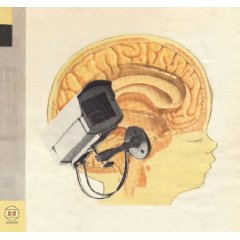Like some permissive homosexual fetish cult straight out of Jan Moir’s worst nightmares, Canadian indie reprobates the Hidden Cameras arrived on these shores with a thrilling and subversive USP: reconciling the hitherto mutually exclusive worlds of church folk music and gay vaudeville.
Mischievous, irreverent and hypnotically infectious, their 2003 breakthrough album The Smell of our Own was an uproarious antidote to the reductive and drearily heterosexual garage rock so ubiquitous at the time. Singer and chief songwriter Joel Gibb appeared to have developed a fresh way of singing about sex which was honest and frequently explicit, without sounding crass or smutty. Furthermore, their political rhetoric also frequently ran against the grain of prevailing consensus: single ‘Ban Marriage’ striking the sort of blow to the happy-ever-after myth of gay marriage which embittered Daily Mail columnists could only dream of.
Alas, six years on and the law of diminishing returns has rather stripped them of their initial vitality and surrealness. There’s an admirable attempt on Origin: Orphan to expand and update their sound after four albums of sticking faithfully to the formula, but the results are at best mixed and at worst distinctly lacklustre. Opener ‘Ratify the New’ is symptomatic of the general malaise, beginning with what vaguely resembles Gregorian chanting before evolving into a six-and-a-half minute prog-folk dirge in vain search of a tune. It’s a transparent and rather self-conscious pitch at artistic maturity – the dreaded ‘m’ word hanging over these eleven tracks like, to paraphrase one of their own charming similes, "the smell of old cum on the rug".
A trio of songs which comprise the album’s dubious centrepiece confirm this ill-advised lurch to the middle-of-the-road: ‘Do I Belong?’ is droney and vocally flat, backed by the sort of dated 8-bit synth riff outlawed by international law in 1987; the doomy, portentous brass crescendos of ‘Walk On’ can’t disguise the trite banality of the lyrics; and the title track’s potentially intriguing meditations on existential angst and conflicted sexuality ("Who in the world put me here to be on my own?") are somewhat drowned out by the barrage of turgid bad-trip pyschedelia. Even attempts to recapture the soaring baroque-pop headiness of yore on single ‘In The NA’ and ‘He Falls To Me’ sound subdued and pedestrian, like tame facsimiles of past glories.
Frustratingly, the record contains a couple of tracks hidden towards the end which hint at an alternative and altogether less staid new direction. ‘The Little Bit’ recalls REM at their most playfully inventive, all cryptic wordplay and rich, over-lapping harmonies. The splendidly saucy electro-pop of ‘Underage’ invokes the unlikely spectre of Tight Fit’s ‘The Lion Sleeps Tonight’ to propel a characteristically gamey lyric on sexual role play: "Let’s do it like we’re underage…. I’ll pretend you’re seven, you’ll pretend I’m eight". Trial by tabloid presumably awaits.
On these songs, and when the Hidden Cameras play to their obvious melodic strengths such as with the ornate, breezily affecting ballad ‘Colour of a Man’, you’re reminded of what a joyous and exuberant proposition they can still be. But as an album Origin: Orphan sounds compromised and stylistically incoherent, the sound of a band fumbling for a new sound and collapsing under the weight of their misdirected ambition.


